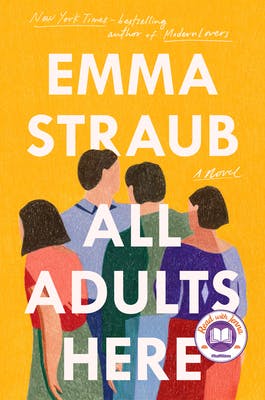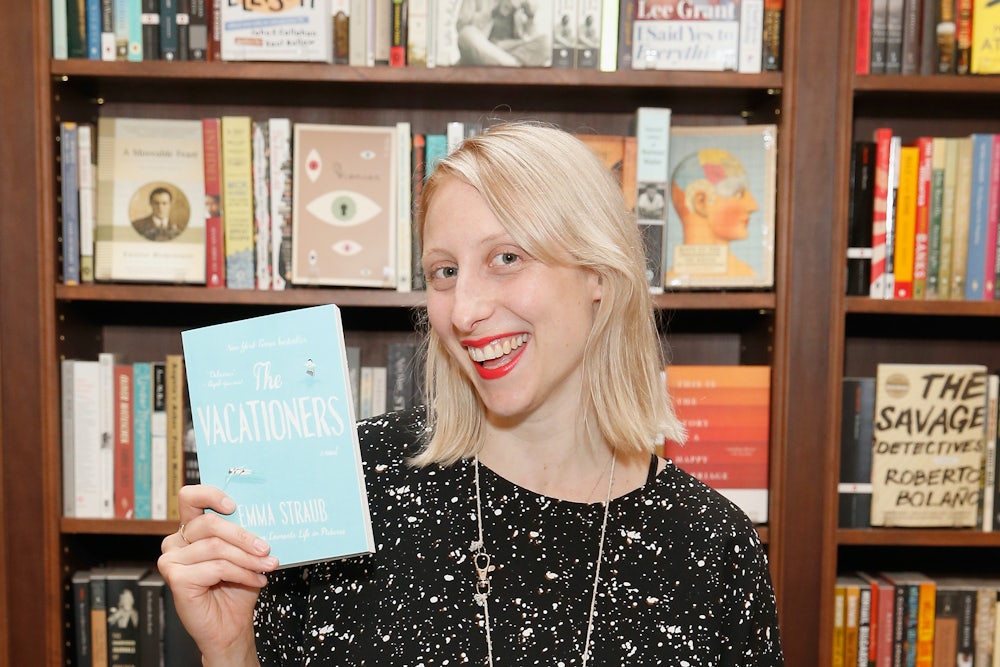Before picking up her new novel, All Adults Here, I did not think that Emma Straub was for me. A Vogue profile in 2016 described meeting up with the writer “in a tiny café” in Cobble Hill—the most expensive neighborhood in Brooklyn—“near where she and her husband recently bought a home.” Add the fact that Straub has written several novels about rich New Yorkers and owns a bookstore called Books Are Magic, also in Cobble Hill, and it was difficult to tell where Emma Straub ended and her books began. Either way: not for me.

Or so I thought. All Adults Here turns out to be her third excellent book about rich, flawed families struggling to stay together. Without having read her work, I had fallen prey to precisely the kind of confusions Straub pitches her novels at: the weird and anxious confines of New York psychology. Her best works feature characters who are ever so slightly clueless about their own privilege, complainers who enjoy comfortable positions in this maddening torrent of a city, where most people swim against the same tide that lifts the one percent’s boats.
Straub began her examination of New York’s upper classes with The Vacationers (2015), about a Manhattan family on holiday in Spain. Next came Modern Lovers (2016), set in Ditmas Park and starring trendy restaurateurs, a real estate agent, and a shiftless dad living on his family’s money. Neither are heavyweight novels, but they pull off a difficult trick: fluffy enough to devour in a few subway rides, yet built on themes solid enough to warrant serious reflection.
Straub’s speciality is the revelation of long-kept family secrets at moments of crisis. All Adults Here takes place in the Hudson Valley, a corridor of vacation spots for New Yorkers escaping the city. The town, Clapham, is fictional, but small and artsy and white and famous for its antiques, like Hudson or Beacon. At the center of the novel is the Strick family, whose three generations—“Gammy” Astrid; her kids Nicky, Porter, and Elliott; plus their kids—gather at the ancestral “Big House” (where Astrid still lives) to deal with an escalating series of disasters.
“The bus hit Barbara just after eleven.” Thus opens the novel’s second paragraph, setting off the action with a literal bang. Astrid, an uptight WASP who does not know how to express love to her children or stop herself from criticizing them, was there when Barbara was mown down in a picturesque street. It is this confrontation with mortality that forces her, at last, to confront her own hidden secrets. Those secrets range from the shame of being homophobic when her kids were young to the delectable fact that Astrid herself is now sleeping with her (also female, also older) hairdresser, Birdie Gonzalez.
All the kids have their own problems, not that they share much with Astrid. Porter is pregnant and doesn’t want to repeat her mother’s coldness with her own child. Elliott is a taut wire of frustration and disappointed hopes, bullied by his own hyperactive twin boys. Nicky is fine, but his daughter Cecelia most certainly is not. Why else would she be sent to live with Astrid for the summer? Straub flips between the internal monologues of the various Stricks, but the novel’s core is Astrid’s regret over her parenting decisions and her wonderment at how the best-laid plans fail. “That was the problem with being part of a family,” Astrid thinks to herself. “Everyone could mean well and it could still be a disaster.”
Straub has a facility for describing homes and buildings, as when she notes that a nursing home for the elderly is “shaped like a tarantula, with a fat middle and legs extending outward, each hall occupied by residents’ rooms.” The metaphor also works for the Strick family, whose problems seem to radiate from Astrid. She is a heart-freezing mix of hypercompetence (“She could name all the plants in her garden and identify trees and birds”) and emotional distance (“she did not invite intimacy the way Porter had observed in other mothers, the kind who would let their children sleep in their bed after a bad dream or get their hair wet in a swimming pool”).
That is a feature of Astrid’s class, but also her gender and upbringing. All Adults Here is a portrait of norms at work in a little, white town as much as it is about one single family, and over the novel’s course Straub builds a strong critique of the ways “respectability” can breed shame. The frantic plot is set at roughly the pace of a Mad Max movie, but that’s what keeps things entertaining.
In the 2016 interview for Vogue, Straub said that she was “totally happy for someone to describe [her] book as a beach read,” though she was glad not to be “put in the chick-lit ghetto.” It’s true that her books are not the weightiest of literary meditations, nor are they schmaltzy dramas about girls in love. They fall somewhere in the middle. All are tightly plotted and yank the reader along at top speed by revealing juicy plot twists at regular intervals.
While All Adults Here has some weaknesses (a too-neat happy ending, a sense of queer people being faintly magical), it would be unfair to demand more depth from a novel that isn’t aspiring to it. Underneath the soap-operatic machinations of the plot, Straub skewers a certain slice of bourgeois upstate society here. The oscillation between satire and sentimentality can be jarring, but then again we all need a shake sometimes.
